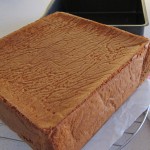Honey Cake
Honey Cake
Portuguese merchants first brought this sponge cake to Japan in the 16th century, when only the port of Nagasaki was open to foreign ships. This is the reason this cake is considered to be Nagasaki’s speciality.
Over the years the cake changed to suit the Japanese palate. Light but moist sponge has always been one of the most popular Japanese sweets for centuries.
(for 24cm square cake tin)
Ingredients
10 eggs separated (medium size)
240g sugar
200g high grade flour-shifted
100g honey
Method
Line cake tin with baking paper. Pre heat oven to 160°C. Put honey in a heatproof bowl and add 4 tablespoons of hot water and dissolve honey.
In a large mixing bowl, put all egg whites. Using an electric mixer, whisk for 30 seconds. Add a quarter of sugar.
Whisk high speed for 2 minutes, add another quarter of sugar, whisk again for 2 minutes, repeat until all the sugar goes in. Continue to whisk until the egg white mixture becomes stiff meringue.
Add half of the egg yolks and mix well, when it is well mixed add remaining egg yolks. Mix well.
Add honey mixture, half at a time and mix well.
Add half the flour and, using a spatula, mix thoroughly. Add remaining flour and mix well.
Pour the cake batter through a sieve in the prepared tin. Tap the tin several times to erase any air bubbles.
Bake in 160°C.oven for 70-80 minutes.
When the cake is done, remove from the oven and leave to cool in the tin for 30 minutes.
While the cake is still warm, wrap in a large piece of cling film and leave to rest for several hours or overnight. This will make the cake settle and evenly moist.
Slice and serve.
Tip. You can halve the ingredients to make a smaller cake – but I found the amount stated works the best. You will be surprised how quickly the cake will disappear! You can wrap any excess cake tightly in cling film; it will remain fresh for up to 3-4 days. This cake also freezes well.







